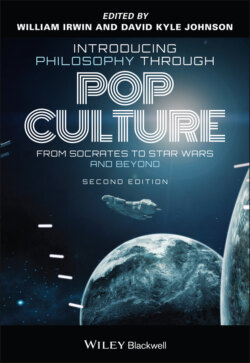Читать книгу Introducing Philosophy Through Pop Culture - Группа авторов - Страница 63
“The Real Question is: What are Those?”
ОглавлениеFictions are tied up with the imagination; a fiction asks us to use our imagination to mentally represent to ourselves what the fiction is describing or showing.7 It asks that we employ a “suspension of disbelief,” treating the fiction as though it's true and allowing ourselves to be immersed in it. Often, we know that what we subsequently imagine really could be (or could have been) if circumstances in the real world were different. Fictions in this sense ask us to imaginatively entertain possibilities, particularly possibilities pertaining to oneself.8
This is what Catriona Mackenzie calls “imagining oneself otherwise.”9 She argues that the cultural imagery that constantly surrounds us – including popular fictions – informs our imagination through constructing a repertoire of imagery upon which we draw when we want to imagine something.10 The subsequent imaginings have affective power: products of our imagination are highly evocative, causing emotional reaction and deep engagement with their content.11 Mackenzie argues that we use imaginative practices to develop our identity and self‐conception, through what we imagine of ourselves.12
For example, Black Panther asks us to imagine a world in which an African nation (Wakanda) did not suffer invasion, colonization, enslavement, and plundering of its resources by a white Western nation. It further asks us to imagine that, given the ability to self‐determine, this country uses its rich natural resources to further develop itself and promote its people, becoming the richest, healthiest, and most technologically advanced nation in the world. Importantly, Black Panther also asks us to imagine that this nation was able to maintain close connection to and honor its cultural traditions, unfettered by Western interference. People in the real world where there is no Wakanda can therefore imagine what might have been, or what could be, had there been an alternate world history. Black audience members have the opportunity to unite themselves around Wakandan identity, building the film's positive representation of Black identity into their self‐conception. The affectivity of fiction‐based imaginings makes this possible.
The hypothetical nation of Wakanda also gives audience members of other racial groups a different or new perspective on Black identity, which can aid their interpretations of the real world. That is, the film challenges racist stereotypes of Black people and culture, suggesting that the absence of a Wakanda‐like nation in the real world is due to Western interference rather than some inherent problem in Black societies. Through the imaginative engagement with fiction, and the affective power of the imaginings, we glean new meanings, significance, and understanding of things in the real world. The epistemic resources we gain from fictions are not language, concepts, or criteria, but another sort of resource – a narrative meaning‐making practice that involves imagining what the fiction tasks us with imagining. With resources like Black Panther improving our collection of epistemic resources, we are able to go forth and interpret the world better than we would have before.
Black Panther is a good epistemic resource by Pohlhaus's definition because the film offers nuanced representation of Black culture, experiences, attitudes, and possibilities, unlike stereotypical representations, and therefore improves our interpretations of the world. Black Panther also reflects aspects of reality and is answerable to experience, despite being fiction, because of the team of majority Black creators who constructed the fiction. Therefore, when the film is used as a tool through which to interpret the world, the interpretation is less likely to be inaccurate or incorrect because of faulty resources. Fictions like Black Panther frame aspects of the real world into its own narrative (like Oakland in 1991 or the history of slavery), and when we consume that fiction we are able to use that framing to better interpret and understand those aspects of the world that the fiction represents. In that sense, consuming films like Black Panther is an epistemic activity as well as an imaginative one. It is an activity of adding to our epistemic resources, both personally in one's own mind, and as a collective of people who now have that resource available to them. Imaginative engagement in the fiction is not merely about entertaining possibilities or building one's self‐conception, it is also about supporting our ability to interpret the world well.
So, let's consider exactly what framing and representations Black Panther offers to its audience. That way we can see how it's not just a good epistemic resource, it's also an example of how an audience's interpretation requires real and fictional knowledge.
